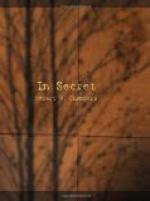To and fro they roamed, doggedly seeking for some sign of water. And the woods seemed damp, too; and there were long reaches of dewy ferns. But wherever McKay dug, his knife soon touched the solid rock below. And they wandered on.
In the afternoon, resting in the shade, he noticed her lips were bleeding—and turned away, sharply, unable to endure her torture. She seemed to understand his abrupt movement, for she leaned slightly against him where he sat amid the ferns with his back to a tree—as a dog leans when his master is troubled.
“I think,” she said with an effort, “we should release our pigeon now. It seems to be very weak.”
He nodded.
The bird appeared languid; hunger and thirst were now telling fast on the little feathered messenger.
Evelyn shook out the last dusty traces of corn; McKay removed the bands. But the bird merely pecked at the food once or twice and then settled down with beak gaping and the film stealing over its eyes.
McKay wrote on tissue the date and time of day; and a word more to say that they had, now, scarcely any chance. He added, however, that others ought to try because there was no longer any doubt in his mind that the Boche were still occupied with some gigantic work along the Swiss border in the neighbourhood of Mount Terrible; and that the Swiss Government, if not abetting, at least was cognizant of the Hun activities.
This message he rolled into a quill, fastened it, took the bird, and tossed it westward into the air.
The pigeon beat the morning breeze feebly for a moment, then fluttered down to the top of a rock.
For five minutes that seemed five years they looked at the bird, which had settled down in the sun, its bright eyes alternately dimmed by the film or slowly clearing.
Then, as they watched, the pigeon stood up and stretched its neck skyward, peering hither and thither at the blue vault above. And suddenly it rose, painfully, higher, higher, seeming to acquire strength in the upper air levels. The sun flashed on its wings as it wheeled; then the distant bird swept westward into a long straight course, flying steadily until it vanished like a mote in mid-air.
McKay did not trust himself to speak. Presently he slipped his pack over both shoulders and took the rifle from where it lay against a rock. The girl, too, had picked up the empty wicker cage, but recollected herself and let it fall on the dead leaves.
Neither she nor McKay had spoken. The latter stood staring down at the patch of ferns into which the cage had rolled. And it was some time before his dulled eyes noticed that there was grass growing there, too—swale grass, which he had not before seen in this arid eastern region.
When finally he realised what it might signify he stood staring; a vague throb of hope stirred the thin blood in his sunken cheeks. But he dared not say that he hoped; he merely turned northward in silence and moved into the swale grass. And his slim comrade followed.




